Cybersecurity is the need of the hour. Although the number of cyber-attack victims is increasing day by day, most of us do not know even essential cybersecurity. We then fail to prevent our information from being compromised, losing thousands or even millions of dollars in the process.
Hence, learning about cyber security is crucial for everyone, especially if you plan to establish a business that relies on customer trust.
In addition, as a career skill, cybersecurity is unsurprisingly lucrative. Since the demand for top cybersecurity and information security engineers is skyrocketing, such specialists make a good sum of money.
According to ZipRecruiter, average cybersecurity engineers in the US make as much as $120000 per year, while senior positions can earn many times this amount.
You may now want to strengthen your cybersecurity skills. This can be done quickly by taking online courses.
Since the internet has offered thousands of such courses, finding the right course can be highly challenging. Furthermore, most of the courses are simply lacking in quality, making them unworthy of enrolling.
Let me do the heavy lifting for you. This article will provide you with the best cybersecurity courses for beginners based on my research and observations. You can then freely choose the one that suits your needs and budget and start learning right away.
Affiliate Disclosure: This article from Victory Tale contains affiliate links. We will receive a small commission from the providers if you purchase cybersecurity courses through those links.
Nevertheless, we always value integrity and prioritize our audience’s interests. You can then rest assured that we will present each course truthfully.
Things You Should Know
Prerequisites
Most courses on the list do not have prerequisites. Therefore, absolute beginners can enroll and take them worry-free. However, some in-depth courses (specified below) will need a basic knowledge of network connectivity.
Criteria
Below are our criteria for the best cybersecurity courses.
Specialized Courses
Specialized courses are for those who aspire to become cybersecurity professionals such as security engineers, security analysts, etc. These courses will drill deeper into the technicals. It will require more commitment. Assignments will also be more challenging.
If you just want to learn some cybersecurity to protect yourself online, please skip this section altogether and consider courses belonging to “layman courses” below.
1. Introduction to Cybersecurity Nanodegree Program
Suppose you are looking for a comprehensive course that covers all cybersecurity essentials and offers excellent student support. In that case, I think you would want to consider this Nanodegree program from Udacity.
Unlike all other courses, this one requires students to have basic knowledge in network connectivity (routers, switches, gateways, and their processes). Thus, it may not be optimal for absolute beginners.
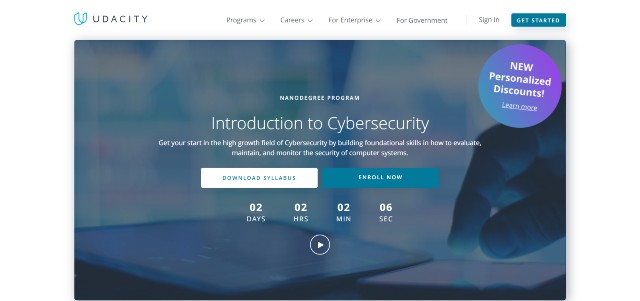
Course Content
Created in collaboration with SecurityScorecard, this program will help you kickstart your journey in cybersecurity and acquire the essential skills required for a professional career in the industry.
The program comprises four minor courses as follows:
1. Cybersecurity Foundations – The first course will deep dive into the fundamentals of cybersecurity. You will understand why cybersecurity plays a vital role in any business and grasp its environment and upcoming trends.
The second part of the course will focus on technicals, including core security principles, critical security controls, best practices, regulations, frameworks.
You will also learn how to use several cybersecurity tools and implement an effective solution to safeguard your information of high importance.
2. Defending and Securing Systems – The second course will thoroughly discuss methods and strategies to defend and secure systems. You will learn about defense best practices and use outputs from previous incidents to improve system administration and security.
In the second part of the course, you will learn about network monitoring and how to detect malicious activities (through firewall outputs and IDS reports).
Finally, you will learn the basics of cryptography to secure data both at rest and in transit.
3. Threats, Vulnerabilities, and Security Response – The third course will be all about the “enemy.” You will learn about cybersecurity threats and threat actors (aka hackers) in detail. You will understand their motivations and be able to use frameworks to assess risks to your assets.
Subsequently, the course will move on to vulnerabilities. You will learn methods that you can implement to detect and fix them before hackers exploit them to their advantage.
Finally, you will learn crucial steps to prepare your system and organization for inevitable attacks and grasp how to deal with the worst-case scenario of your data getting compromised.
4. Governance, Risk, and Compliance – The program’s final course will focus on the GRC (cybersecurity Governance, Risk, and Compliance), which has become vital for creating an effective cybersecurity strategy.
You will learn about Governance, Risk, and Compliance in detail and perceive how to articulate the connection between them to shape a robust strategy.
Apart from high-quality video lessons, each course has numerous quizzes and assignments that you can complete to practice and solidify your skills.
Furthermore, in every course, you can work on a challenging project that will provide you with opportunities to single-handedly handle tasks like an actual security professional in real life.
For example, you will be tasked with monitoring and securing a virtual company and investigating a security incident.
Regarding the pace, Udacity recommends spending 10 hours per week, and you will complete the program in 4 months.
However, you can adjust the pace at will since the program is self-paced. Just keep in mind that the more time you spend on the course, the higher the tuition fees (see below).
Student Support
Once you enroll in the program, you will be able to access three types of student support as follows:
Technical Mentor Support – You can ask technical questions to your mentor through the ticketing system 24/7, effectively eliminating any need to wait for an instructor to reply to your questions.
Also, most students receive a speedy reply in less than an hour. Thus, if you get stuck in any part of the program, you can rest assured that you can reach someone for prompt assistance at any time.
Project Reviews – Udacity projects are known to be highly challenging, thus potentially overwhelming some students. However, this will not be an issue since you can send unlimited requests to experts to review your work.
Experts will provide personalized feedback, tips, and tricks, which will help you improve your project-building skills and encourage your confidence.
Career Services – Like web development bootcamps, Udacity Team will review your resume, LinkedIn profile, and Github portfolio to ensure that they are up to professional standards. This service will be exceptionally beneficial if you want to secure interview invitations from tech giants.
Pricing
Udacity uses a subscription-based model in its pricing. However, recent changes allow students to access the rest of Udacity’s programs, such as data analytics, programming, and many more.
Currently, the program costs $250 per month or you can purchase the annual bundle for $2390. The average cost per month will be $200 or approximately 20% lower.
Tips
New students can create an account and receive personalized discounts as high as a 40% off. In other words, you can enroll in this exceptional program by paying only $120 monthly.
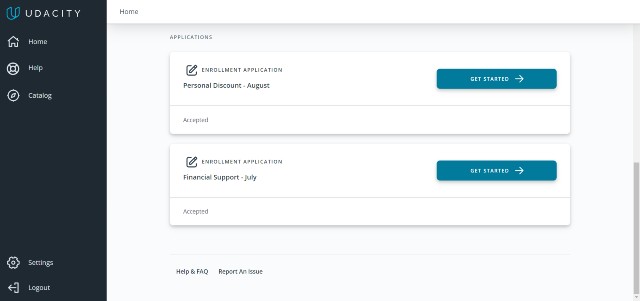
If you are still unsure whether this program is for you, I suggest you download the syllabus available on the course page to grasp all the details regarding course content, learning features, and student support.
[sc name=”udacity” ][/sc]Pros & Cons
Pros
- Unarguably one of the best online cybersecurity courses for beginners who want to pursue a career in cybersecurity
- Learn from a team of leading experts who have years of experience in the IT security industry
- In-depth and informative lessons covering all cybersecurity essentials
- Numerous assignments and challenging real-world projects
- Timely mentor support that can provide assistance when you get stuck
- Unlimited project reviews that help strengthen your project-building skills
- Career service is a big plus.
Cons
- Costlier than most other alternatives
- No free trial
2. MicroBachelors® Program in Cybersecurity Fundamentals
Unavailable as of Oct 2023
This MicroBachelors program provides comprehensive training suitable for steadfast learners who aim for cybersecurity careers.
You will learn from two faculty members from New York University, whose master’s program in cybersecurity is one of the best in the United States.
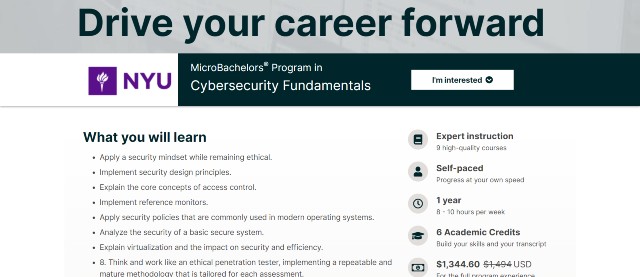
Course Content
This program consists of nine courses separated into three sections: Information Security, Network Security, and Penetration Testing.
Information Security
Note: Unless you have an excellent background in certain areas, NYU recommends taking each course (and section) in order.
1. Introduction to Information Security – The first course will focus on information security basics. In essence, you will learn about the CIA Triad, security design principles, and threat modeling. Once you complete the course, you will grasp all crucial ISP concepts.
2. Authentication and Access Control – The second course will start with basic cryptography. You will learn about symmetric and asymmetric encryption and its usage in PKI and digital certificates.
The second part of the course will deal with access control mechanisms. You will explore access control in virtual machines (VMs), virtualization, and containerization and perceive how the OS achieves access control.
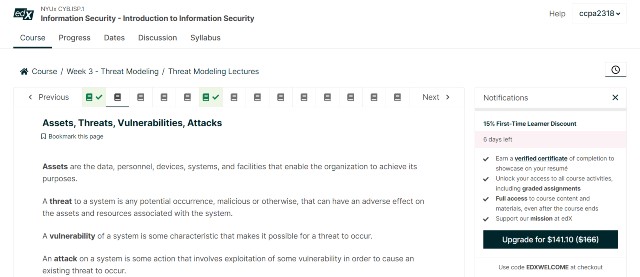
3. Advanced Topics – The last course is the information security section will discuss advanced topics. You will explore prevalent attacks on web applications such as XSS, SQL Injection, and CSRF from a high-level view and understand how to mitigate them.
The second part will focus on how we (and indeed those hackers) can obtain anonymity through methods. You will also learn to verify hardware and software integrity to ensure that the one you have been working with is not modified or compromised.
Finally, the course will move to cryptocurrencies. You will learn about its technical background in detail.
Network Security
4. Introduction to Network Security – In essence, you will learn how malicious users attack networks. You will start with basic stuff such as the CIA Triad, a threat tree, and an attack tree, and later move to the attacking methods: DoS/DDoS attacks, DNS Poisoning, Phishing, Trojans, and many more.

5. Protocols – The fifth course of the series will continue where the fourth left off. First, you will learn about cryptographic algorithms used in networking protocols and how to use them to fend off cyber attackers.
Next, you will explore more attacking methods such as MAC, VLAN hopping, DHCP, and ARP attacks and thoroughly understand how to develop effective countermeasures against them.
6. Advanced Topics – The sixth course will offer insights on advanced network security topics. You will learn how to perform network security monitoring. You will be able to use various systems and tools to detect potential attacks or breaches.
The second part will discuss steps to use firewalls to secure the perimeter of your networks and systems. Subsequently, you will also grasp the difference between IPv4 and IPv6 and learn further about IPv6 security.
The knowledge you learn from this section will be highly beneficial if you want to continue your journey in ethical hacking or pen-testing.
Penetration Testing
7. Discover Vulnerabilities – The seventh course will introduce you to all vital pen test methodologies and the initial stages of penetration testing (Scoping, Reconnaissance, Scanning, and Vulnerability Assessment).
Specifically, you will learn to perform scoping, OSINT gathering, identification of targets, and map attack vectors.
In this course, you will have the opportunity to gain hands-on experience. You will scan for targets & vulnerabilities in the tested system and map the attack vectors on your own.
8. Exploitation – The ninth course is dedicated to the exploitation stage of penetration testing. First, you will apply methodologies to ensure that your test is high quality and analyze results from automated testing tools to validate findings or discover key flaws.
Next, you will create testing and exploitation scripts and exploit flaws to evaluate risks to the tested organization. Once you are done with the entire process, you will analyze and assess the impact of the exploitation of application flaws.
9. Post-Exploitation – The final course in the program will discuss the end phases of penetration testing. You will use hash dumps to discover credentials, perform pass-the-hash attacks, and document the test results.
Later on, you will utilize exploited systems to access others or perform privilege escalation. Finally, you will configure your exploration tools to pivot through the target environment.
In addition, you will also learn how to accurately determine the value of the compromised machine and maintain control of the device for later use.
Overall, the curriculum for this program is comprehensive and in-depth. Each course also has numerous assignments, quizzes, and even a final exam to practice and evaluate your skills over time.
Therefore, suppose you genuinely want to master cybersecurity but don’t want to invest tens of thousands of dollars in expensive cybersecurity bootcamps. You might want to give this course a try.
NYU suggests spending 8-10 hours on the program, and you will finish the program in a year.
Coaching, Academic Credits & CompTIA Security+ Discounts
This cyber security training program has three extra benefits that others do not provide.
First, if you have access to US phone lines, you can get assistance from your coach for free. Your coach will help you navigate the program, advise you on career exploration, and solve any problem that occurs.
Second, once you pass the final exam (score more than 70%), you will receive as many as six academic credits from Thomas Edison University (not NYU).
Third, upon program completion, you can receive a 36% discount on the CompTIA Security+ exam, one of the most recognized cybersecurity certifications. Also, you can use the course materials of this program to prepare for the certification exam since it covers almost the same topics that will appear in it.
Important Note: You will need to enroll in a verified track to access these benefits (read more information below).
Pricing
The verified track, which includes graded assignments, a digital certificate, and all the above benefits, costs $1344 one-time.
You can choose the audit option. However, I think the verified track is worth enrolling in since you will receive feedback on your work, ensuring that you are on the right track.
Pros & Cons
Pros
- Learn from faculty members of a world-class university renowned for its cybersecurity program
- Best for students who want to pursue a career in penetration testing
- Well-structured curriculum covering both theories and applications in detail
- Informative and in-depth lessons
- Gain hands-on experience (not just learn the concepts)
- Self-paced learning
- Access to a coaching service (US Phone lines only)
- Provide six academic credits from Thomas Edison University
- Receive discounts on the CompTIA Security+ exam
- Free auditing
Cons
- Expensive than most other alternatives
3. MicroMasters® Program in Cybersecurity (RIT)
This MicroMasters program from RIT (Rochester Institute of Technology) is a solid contender for the NYU program above. In this program, you will learn the basics of cybersecurity and develop practical skills in real-world scenarios.
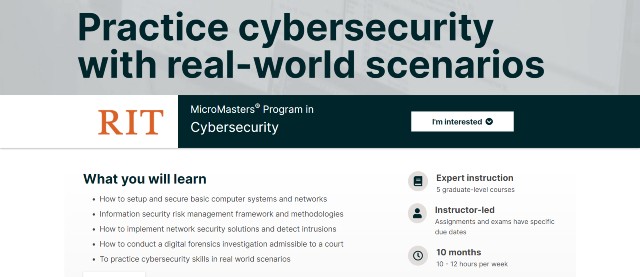
Course Content
This program consists of four graduate-level courses and a capstone project as follows:
1. Cybersecurity Fundamentals – In this course, you will learn core concepts of cybersecurity along with valuable tools that are instrumental for solving issues in the security domain.
Subsequently, the course will discuss essential techniques to safely manage and protect networks and systems from threats and attacks.
Finally, you will learn how to devise and implement solutions for both SMBs and enterprises.
2. Computer Forensics – The second course will be all about performing an investigation to gather related to security breaches and other related crimes. You will learn standard procedures and techniques for collecting evidence that will be admissible by the court.
3. Cyber Security Risk Management – The third course will tackle risk management concerning cybersecurity. You will learn about the fundamental principles of risk analysis and the steps to assess risks.
Subsequently, you will perceive how qualitative and quantitative frameworks can help mitigate risks. You will also learn how to apply both along with machine learning to assess risks accurately.
In this course, you will analyze several insightful case studies that will be extremely helpful in elucidating the theoretical part you have learned.
4. Network Security – The fourth course will tackle network security. First, you will learn the fundamentals of both wired and wireless security and explore methods to secure your networks, such as filters and encryption.
The second part will teach you to determine the effectiveness of different defensive mechanisms against various types of attacks. You will analyze attack & defend scenarios and come up with actionable insights.
5. Capstone – This large-scale project will grant you an opportunity to obtain significant hands-on experience. RIT does not provide specific information about the tasks that you will be assigned. However, you should assume that you will use all knowledge you learned from all previous courses.
Important!: This program is instructor-led. All assignments and exams have specific due dates. Hence, you cannot learn at your own pace. Before enrolling, make sure you don’t have a tight schedule since you need to spend 10-12 hours per week for ten months in the program.
Comparing this program to NYU’s, you will realize a slight overlap in course content between the two. Both will discuss cybersecurity fundamentals and network security, but this program will move forward to forensics and risk management, while NYU’s will proceed to penetration testing instead.
Hence, if you are a business owner, you will be better off with this program from RIT. On the other hand, NYU’s program will satisfy those who aspire to become cybersecurity professionals.
Master’s Degree Credit
Upon program completion (verified track only), you will receive as many as nine credits that can be counted toward a Master’s Degree in computing security at RIT, which will significantly reduce tuition fees.
Note: You still need to apply to RIT’s graduate school and get accepted. Otherwise, those credits would be of no use.
Pricing
Auditing all the courses is again free, while the paid verified track costs $1436 one-time.
Pros & Cons
Pros
- One of the best cybersecurity courses online for business owners and executives
- Well-structured curriculum
- Informative and in-depth lessons
- Gain hands-on experience through laboratories, experiments, and case studies
- Receive 9 Master’s Degree credits (verified track only)
- Free auditing
Cons
- Instructor-led program: You cannot learn at your own pace. Thus, you will have limited time to complete assignments and exams.
- Require high weekly commitment
4. Introduction to Cyber Security Specialization
This Coursera specialization from New York University is another promising alternative you might want to consider. You will learn about modern cyber technology and appropriate methods and strategies.
Note: You may realize that this and the edX program (#2) are from NYU. However, this Coursera specialization is much less in-depth and requires less commitment. If you have already taken the edX program, there is no need to enroll in this program at all.
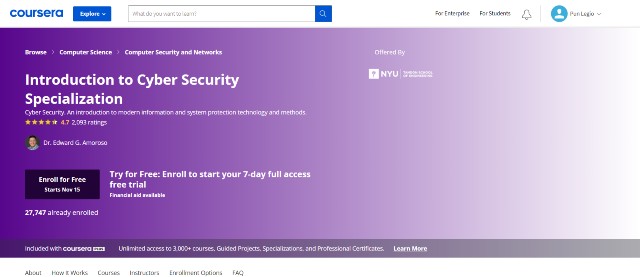
Course Content
The specialization consists of four minor courses as follows:
1. Introduction to Cyber Attacks – The first course will drill deep into everything cyber attacks. You will learn how threat actors design and construct cyber attacks, such as Trojan Horses, Internet Worms, Distributed Denial of Service (DDoS), and many more.
Later, you will learn to perform basic cybersecurity analysis and create threat-asset matrices to prioritize risk decisions.
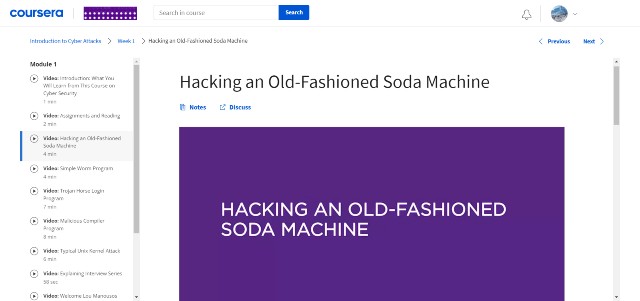
2. Cyber Attack Countermeasures – The second course focuses on defense mechanisms. You will learn about foundational models, policy enforcement mechanisms, and authentication solutions that help fend off cyber attacks
The second part of the course will discuss cryptography and its techniques (i.e., cipher block chaining and triple-DES) to help secure eCommerce businesses.
3. Real-time Cyber Threat Detection and Mitigation – The third course will mainly discuss real-time cybersecurity techniques and methods in the context of TCP/IP suites. You will learn about TCP/IP hacks and the role of perimeter solutions (such as firewalls and intrusion prevention systems) in protecting enterprise assets.
Subsequently, you will learn the weaknesses of perimeter solutions that lead to attacks from APTs (Advanced Persistent Threats)
4. Enterprise and Infrastructure Security – The final course in the program will be dedicated to explaining advanced enterprise security concepts. Apart from emerging security issues, you will learn about enterprise compliance frameworks and how to use hybrid cloud architectures to eliminate security weaknesses.
This course is excellent for those who want to learn essential cybersecurity but do not want to penetrate too deep into the technical aspect.
Every course has its own sets of quizzes and assignments that help you practice. However, if you want to perform actual tasks, you would better consider other alternatives.
Regarding pace, New York University recommends spending 4 hours per week on the course, and you will complete it in 4 months.
You can audit every cyber security course in the specialization for free. However, if you want your assignments to be graded, you will need to subscribe to the full course, costing $39 per month.
Pros & Cons
Pros
- Learn from a professor at a prestigious US university
- Beginner-friendly
- Well-structured curriculum
- Informative and engaging lessons
- Clear explanations of concepts
- Excellent reading materials
- Free auditing
Cons
- The assignments are not very challenging and, in a few cases, irrelevant due to wording issues.
- No student support
5. IBM Cybersecurity Analyst Professional Certificate
This gigantic Coursera Professional Certificate program from IBM is an excellent option if you are an absolute beginner who wants to grasp the general idea of cybersecurity.
In this program, you will learn about all branches of cybersecurity and put that knowledge into use through working on projects.
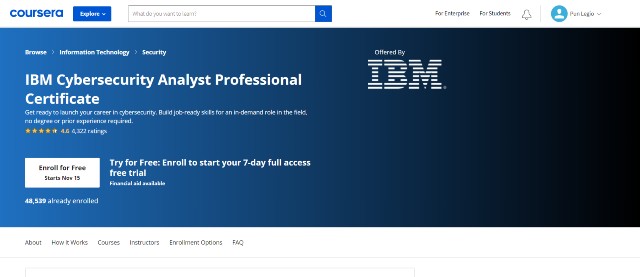
Course Content
The program comprises six courses, one project, and a final exam as follows:
1. Introduction to Cybersecurity Tools & Cyber Attacks – This course will cover the basics of cybersecurity and cyber attacks. You learn about key terminology, types of cyber attacks, and motives of threat actors.
2. Cybersecurity Roles, Processes & Operating System Security – The second course will continue where the first left off. You will learn about crucial cybersecurity processes and grasp how modern OS systems (Windows, Linux, macOS) work by looking at their architecture and file systems.
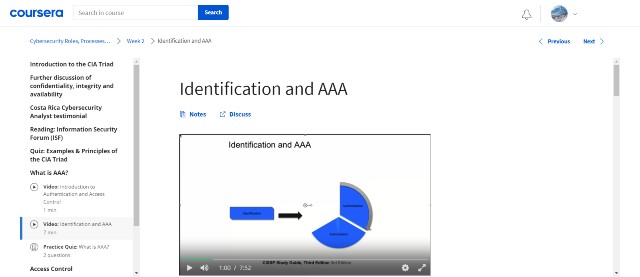
3. Cybersecurity Compliance Framework & System Administration – You will learn to use basic commands for user and system administration. Later on, you will perceive how endpoint security and patch management can help keep attackers at bay.
4. Network Security and Database Vulnerabilities – The fourth course will introduce you to network security. You will learn about fundamental concepts such as LAN, TCP/IP, OSI Framework, and Routing and understand how they can affect your organization’s security.
The second part of the course will discuss database vulnerabilities and tools that you can use to detect them for various RDBMS (SQL) and non-RDBMS (MongoDB)
5. Penetration Testing, Incident Responses, and Forensics – The fifth course will deep dive into penetration testing. You will learn the processes that PenTesters need to perform in each phase and the tools that help them find vulnerabilities.
Later, you will learn how an organization should take action when an incident has occurred in real life and understand methods to collect crucial data in the forensic process.
6. Cyber Threat Intelligence – The sixth course will explain which tactics an organization should use to defend its network and learn about several tools that can help prevent data loss and classify data in a database
7. Capstone: Breach Response Case Studies – In this project, you will use all the knowledge from six previous courses to analyze one of the actual cybersecurity breaches and formulate the right strategy to reduce recurring threat risks.
8. IBM Cybersecurity Analyst Assessment – The last section of this program is essentially the final exam that will test all your knowledge acquired from all six courses and projects.
This program covers more topics than NYU’s but will only touch the basics. It is an excellent option for beginners who want to learn how things work and kickstart their journey in this industry.
However, if you are an upper beginner who understands some cybersecurity, I don’t think this course is for you.
According to IBM, you should spend 4 hours per week on the program, and you will complete it in 8 months. Auditing every course is again free, while a verified track costs $49 per month.
Note: Some students have problems with the audio quality. You may want to start with the audit option to ensure it is acceptable.
Pros & Cons
Pros
- Beginner-friendly cybersecurity course
- Easy-to-follow curriculum
- Good reading materials
- Videos, subtitles, and transcripts are all downloadable.
- Comprehensive curriculum, providing an excellent overview of cybersecurity
- Free auditing
Cons
- Several students are having issues with the audio quality of the first course.
6. Cybersecurity for Business Specialization
This Coursera specialization from the University of Colorado aims to give business owners a practical perspective on cybersecurity. You will understand what threatens your business and be able to complete steps to defend it.

Course Content
This specialization comprises four minor courses as follows.
1. Introduction to Cybersecurity for Business – The first course will introduce you to general computer security in the most straightforward manner. You will learn how large enterprises such as financial institutions secure their networks and websites and assess cybersecurity risks.
2. Cyber Threats and Attack Vectors – The second course will discuss the types of threats and actor vectors many businesses and enterprises face today. You will also understand the motives of cybercriminals and how they perform attacks in real life.
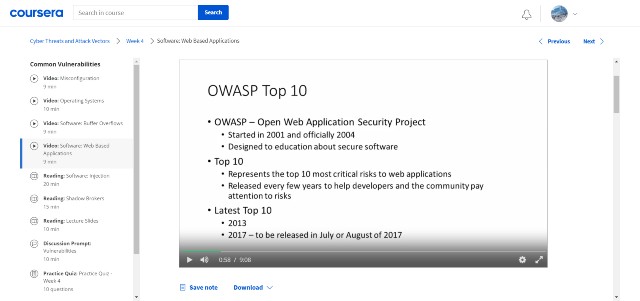
3. Detecting and Mitigating Cyber Threats and Attacks – The third course will explain the steps and strategies you should implement to detect and mitigate cyber threats.
Thus, you can communicate effectively to technical support about features you want in a firewall or sensitive data you want to add another layer of security to protect.
4. Proactive Computer Security – The final course will be about penetration testing and its benefits in securing your systems. You will also have the opportunity to plan your unique methodology and apply it to your existing systems.
Unlike other Coursera programs, this one does not have a capstone project. Still, each course will have its own project that you can work on and gain hands-on experience.
Regarding the pace, the university recommends spending 2 hours per week on the program, and you will complete it in five months.
Auditing all the courses is free, while the full specialization costs $49 per month.
Pros & Cons
Pros
- One of the best cyber security courses for business owners and executives
- Beginner-friendly
- Well-structured, easy-to-follow curriculum
- Clear explanations and concrete examples
- Easy-to-read transcripts
- Free auditing
Cons
- No capstone project for students to synthesize knowledge from all courses
7. Information Security: Context and Introduction
If you are looking for more concise cybersecurity training, this course from the University of London is undoubtedly worth your consideration. Under the guidance of three professors, you will learn information security concepts and handily apply them to your systems.
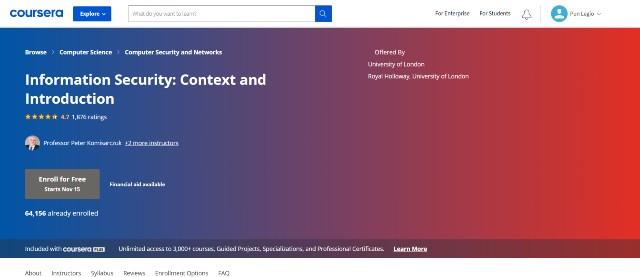
Course Content
As a standalone course (not a specialization), it will require less time and commitment to complete the course. Most students spend approximately 24 hours doing so.
Below is a summary of what you will learn from the course.
- Introduction to Information Security (CIA Triad, RMIAS Model, etc.)
- Introduction to Cryptography (Core concepts, types, weaknesses, real-life applications)
- Network and Computer Security (Network security protocols & systems, vulnerabilities, security tools, computer networks)
- Security Management (Policies, Controls, Risk Management, Legal Frameworks, incident management, etc.)
The goal of this course is more to create cyber security awareness than to build specialized skillsets for average learners. Thus, the course will not be as comprehensive as other alternatives. However, absolute beginners will find it beneficial in kickstarting your journey.
This course is free to audit, but if you want graded assignments and a certificate, you must buy a full course that costs $49 one time.
Pros & Cons
Pros
- Excellent online course to learn cyber security for absolute beginners
- Well-structured curriculum providing an overview of core cybersecurity areas
- Clear explanations of information security topics
- High-quality course materials
- Free auditing
Cons
- Not comprehensive or in-depth. If you want to pursue a career in cybersecurity, you may want to consider other alternatives instead.
Coursera Plus
This post features several Coursera programs. Hence, you may be interested in more than one of them and don’t know which one to invest your money and time in.
If that’s the case, you can just enroll in all of those through Coursera Plus. With this subscription, you can gain full access (not just audit) to more than 3000 courses, programs, and specializations or more than 95% of those available on the platform.
Furthermore, Coursera Plus costs only $399 per year or $33.25 per month on average, cheaper than an individual specialization/program subscription that costs $39-$79 per month.
Hence, Coursera Plus is your best bet if you are a steadfast learner since it provides far more value for money.
[sc name=”coursera” ][/sc]Layman’s Courses
Below are courses designed to teach average Joe cybersecurity concepts and help him become aware of cybersecurity threats.
Layman’s courses are informal, inexpensive, require low commitment, and focus on tips and techniques that can be beneficial for an average person to protect himself in real life.
However, besides providing solid foundational knowledge, it will not help you much if you want to become a security professional.
8. Nathan House’s Course
This top-rated course from Nathan House on the Udemy platform will equip you with fundamental skills to stay safe and anonymous online. I highly recommend taking this course if you keep getting scammed by cybercriminals.
Nathan is the owner of a cybersecurity consulting firm with more than 25 years of experience in the field. I personally took this course and found out that he is highly knowledgeable and exceptional in simplifying complicated concepts. Hence, I decided to recommend him to you.
Note: This course consists of four volumes. You have to purchase each separately since Udemy does not offer bundle pricing.
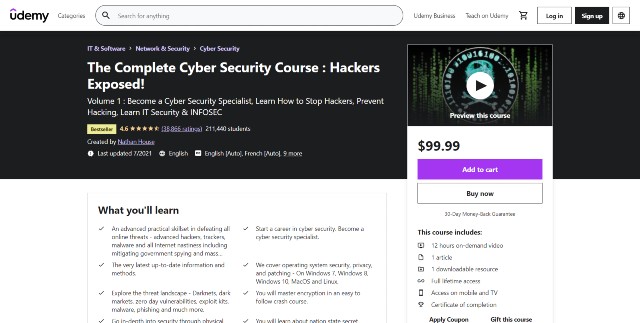
8.1) The Complete Cyber Security Course: Hackers Exposed!
The first volume of the series will introduce you to basic IT security. Below is a summary of what you will learn from the course.
- Introduction to Cybersecurity
- Threat & Vulnerability Landscape (from “your” perspective and “their” perspective)
- Dark Net and mindset of cyber criminals
- Encryption (Symmetric/Asymmetric, Hash Functions, Digital Signatures, E2EE, etc.)
- OS Security & Privacy (Windows, macOS, and Linux)
- Bugs and Vulnerabilities
- Behavioral security controls to safeguard against cybersecurity threats on social media
- Isolation and Compartmentalization
The video content of this volume is 12 hours long. The curriculum focuses on the practical aspects that even an average person can implement to safeguard their online security and privacy.
Thus, this volume is most suitable for those who want to learn some cybersecurity but don’t want to become a cybersecurity professional.
Reviews: 4.6/5.0, Students: 211000+
8.2) Network Security
The second will drill deep into network security. What you will learn from this course is as follows.
- Port and Vulnerability Scanning
- Deep dive into firewalls
- Network Attacks and Network Isolation
- Wireless and Wi-fi security
- Network Monitoring (Wireshark, tcpdump, tshark, etc.)
- Privacy – Tracking methods such as IP address and cookies
- Search Engine and Browser Security
- How to create a solid personal password policy + Authentication
The video content is 12.5 hours long, focusing on strengthening our security in daily life which involves internet usage. Upon course completion, the average person will understand how to stay anonymous and keep their network safe.
Reviews: 4.6/5.0, Students: 134000+
8.3) Anonymous Browsing
The third course will train you on the steps you need to take to ensure that you remain anonymous online. You will learn the following topics:
- OPSEC (Operational Security) – Identities, Pseudonyms, Aliases, etc.
- Live Operating Systems
- Virtual Private Networks (VPNs)
- Tor Browser – Features, Strengths, Weaknesses
- Proxies and SSH Secure Shell
- I2P
- Censorship Circumvention – Tips to bypass firewalls & deep packet inspection
- Steps to create nesting privacy and anonymizing services
- How to achieve anonymity with offsite internet connections and mobile devices
I find this 13.5-hour-long course particularly useful if you live or plan to visit a country with high censorship. The knowledge learned from this course will allow safe browsing without hassles.
Reviews: 4.8/5.0, Students: 80000+
8.4) Endpoint Protection
The final volume of the series will discuss strategies to protect your endpoints (PCs, mobile devices, etc.) and eliminate intruders that may sabotage your devices from within. Thus, it is an excellent course for those who frequently become victims of online shenanigans.
Below is a summary of what you will learn from this 16.5-hour-long course.
- File and Disk Encryption
- Anti-virus and Endpoint Protection
- Application and Execution Control
- Threat Detection and Monitoring
- Seek & Destroy malware on your devices
- OS and application hardening
- Secure File Deletion, Evidence Elimination, Anti-Forensics
- Email Security, Privacy and Anonymity
Reviews: 4.6/5.0, Students: 71000+
Pros & Cons
Pros
- Comprehensive cybersecurity course for an average person with no tech skills
- The instructor explains complicated concepts in a way that a layperson can understand.
- Well-structured curriculum
- Informative lessons with visuals
- Lifetime Access + 30-day money-back guarantee
- Inexpensive ($20 or lower for each when on sale)
Cons
- The introductory lessons are pretty dull, causing me to doze off several times. You need to get to Chapters 2-3, where the fun begins.
- Some parts of the courses are now outdated.
- Provide very few opportunities to gain hands-on experience
Other Alternatives
Below are additional cyber security courses in which some may be interested. However, I find that all these courses have significant issues. Thus, I decided not to include them in the list above.
Cybersecurity Specialization by the University of Maryland – This Coursera specialization aims to provide training for those interested in cybersecurity. However, most of the software and learning resources are now outdated. Thus, you will not be able to complete any project in the course.
Free Cybersecurity Courses Online?
If you want to take some free courses to test the waters, it is best to audit the ones I recommend above (edX or Coursera).
Auditing these courses is far better than taking any random course that may provide inaccurate data or equip you with the “wrong” mindset that may later impede your learning.
Relevant Courses
Students who are into cybersecurity and want to expand their knowledge even further may find the list of courses below beneficial.
- Network Security – Coming Soon
- Ethical Hacking or Penetration Testing (PenTest)
- Enterprise Security – Coming Soon
- Security Analyst – Coming Soon
- Security Engineer – Coming Soon
- CompTIA Security+ – Coming Soon